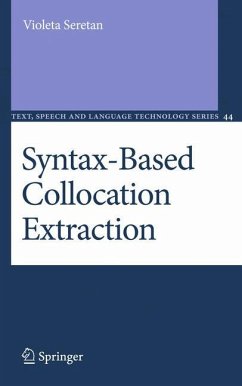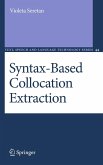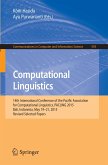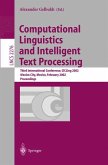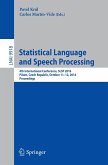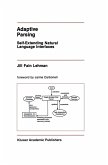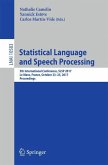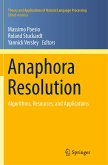Syntax-Based Collocation Extraction is the first book to offer a comprehensive, up-to-date review of the theoretical and applied work on word collocations. Backed by solid theoretical results, the computational experiments described based on data in four languages provide support for the book's basic argument for using syntax-driven extraction as an alternative to the current cooccurrence-based extraction techniques to efficiently extract collocational data.The work described in Syntax-Based Collocation Extraction focuses on using linguistic tools for corpus-based identification of collocations. It takes advantage of recent advances in parsing to propose a novel deep syntactic analytic collocation extraction that has applicability to a range of important core tasks in Computational Linguistics.The book is useful for anyone interested in computational analysis of texts, collocation phenomena, and multi-word expressions in general.
From the reviews:
"This book tackles the question of Syntax-Based Collocation Extraction from a computational perspective. It first gives an overview of collocation studies over time and then details the creation of a collocation extraction tool developed by the author ... . The book is well written with all the procedures clearly described. ... The computational part of the book is extremely thorough and well documented ... . As it stands, this book could be required reading in NLP ... ." (Geoffrey Williams, International Journal of Lexicography, Vol. 26 (1), 2013)
"This book provides a much-needed overview of the state of the art on collocations and their identification from a NLP perspective. ... The book can also serve as a step-by-step guide to identification in practice, discussing methodological choices and the impact of different levels of pre-processing in terms of performance. ... the book can serve as both a good introductory text for anyone starting on the field and an up-to-date compilation of the main references and recent advances in context for the expert reader." (Aline Villavicencio, Natural Language Engineering, Vol. 18 (4), 2012)
"This relatively short book is very interesting for the justification it makes for syntactic parsing in the extraction of word types from texts. It gives a very clear and painstakingly documented account of two experiments in extracting collocations, or associated words, from digital texts in English and three other languages--French, Italian, and Spanish. ... This book makes an interesting contribution to the challenges of dealing with the properties inherent to natural language that have made computational approaches difficult." (Alice Davison, ACM Computing Reviews, September, 2011)
"This book tackles the question of Syntax-Based Collocation Extraction from a computational perspective. It first gives an overview of collocation studies over time and then details the creation of a collocation extraction tool developed by the author ... . The book is well written with all the procedures clearly described. ... The computational part of the book is extremely thorough and well documented ... . As it stands, this book could be required reading in NLP ... ." (Geoffrey Williams, International Journal of Lexicography, Vol. 26 (1), 2013)
"This book provides a much-needed overview of the state of the art on collocations and their identification from a NLP perspective. ... The book can also serve as a step-by-step guide to identification in practice, discussing methodological choices and the impact of different levels of pre-processing in terms of performance. ... the book can serve as both a good introductory text for anyone starting on the field and an up-to-date compilation of the main references and recent advances in context for the expert reader." (Aline Villavicencio, Natural Language Engineering, Vol. 18 (4), 2012)
"This relatively short book is very interesting for the justification it makes for syntactic parsing in the extraction of word types from texts. It gives a very clear and painstakingly documented account of two experiments in extracting collocations, or associated words, from digital texts in English and three other languages--French, Italian, and Spanish. ... This book makes an interesting contribution to the challenges of dealing with the properties inherent to natural language that have made computational approaches difficult." (Alice Davison, ACM Computing Reviews, September, 2011)

